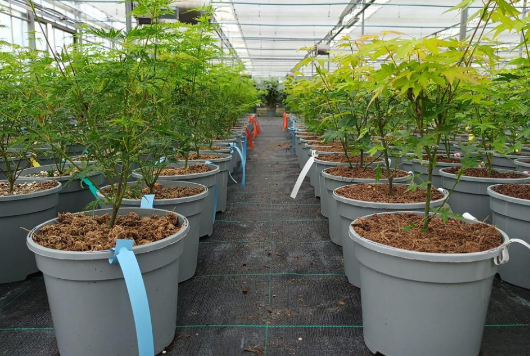
The Royal Horticultural Society is sharing its peat-free advice as gardeners across the UK get ready for the growing season.
With the increasing need for all of us to adopt more environmentally friendly practices, the start of spring presents a chance for the UK’s 30 million gardeners to make a positive impact on the planet. Using peat-free compost is one of the most important and simple changes gardeners can make in the fight against climate change.
Peatlands are natural boggy habitats that store over twice as much carbon as all the world’s forests combined, as well as being unique ecosystems, with a range of wildlife depending on them. Extracting peat destroys habitats, releases stored carbon and stops peatlands acting as a sponge for the landscape, increasing flood risk downstream.
In light of the devastating impact of peat extraction, the RHS has pledged to become 100% peat-free in all its operations by the end of 2025, including shows, gardens and retail. We stopped selling peat-based composts in 2019 and all the plants we grow for RHS gardens are peat-free.
Here are some top tips to help gardeners get the best out of peat-free compost, and even make their own:
- Choose the right compost. In recent years many new peat-free mixes have been developed meaning there is something to cater to every need. It’s important to select a compost that will suit the plants growing in it, whether they’re seedlings or long-term container plants; acid-loving or carnivorous. Check the packaging to see which plants the mix is suitable for and remember, if it doesn’t say ‘peat-free’ then it most likely isn’t.
- Water with care. Peat-free mixes will have slightly different watering needs to peat, so gardeners that are used to peat may need to alter their watering frequency and amount. Peat-free composts can also look dry on the surface, making it easy to overwater. Use your fingers to check the moisture levels under the surface where possible, or lift the container to feel how heavy it is.
- When it comes to sowing seeds and root cuttings, use specific seed and cuttings peat-free compost. These are milled to a finer texture which is important for smaller seeds, while multi-purpose composts are better suited to more established plants as they contain more fertiliser that is released more slowly.
- Feed your seedlings. Seed and cuttings compost contains very few nutrients, so it’s advisable to start feeding once seedlings have produced their first true leaves, and then often enough to keep plants looking healthy. Liquid seaweed feed or similar, or home-made options such as liquid from a wormery are all good options.
- Try making your own compost as a soil improver, to avoid wasting shop-bought compost on borders. Use a mixture of ‘green waste’ such as grass clippings, annual weeds and kitchen peelings, and ‘brown waste’ such as chopped hedge trimmings and shredded cardboard. It’s important not to let any single material dominate, and if possible compost should be ‘turned’ several times a year in order to help the ingredients break down.
- Buy peat-free plants. Gardeners looking to buy more sustainably grown plants can use our list of peat-free nurseries in the UK. These nurseries offer a wide range of plant types and are located across the country, with many online options too. To find out more visit: www.rhs.org.uk/advice/peat/peat-free-nurseries
Nikki Barker, RHS Peat Free Transition Technician, said: “The start of the growing season presents an opportunity for gardeners to make positive changes for the environment and choosing peat-free compost is a small step with a massive impact. While there are some practical differences between using peat-free mixes and peat compost, by following these steps gardeners can continue to get brilliant results with their plants, while helping out the planet at the same time.”
For more information and advice on how to go peat-free visit: www.rhs.org.uk/advice/peat-free